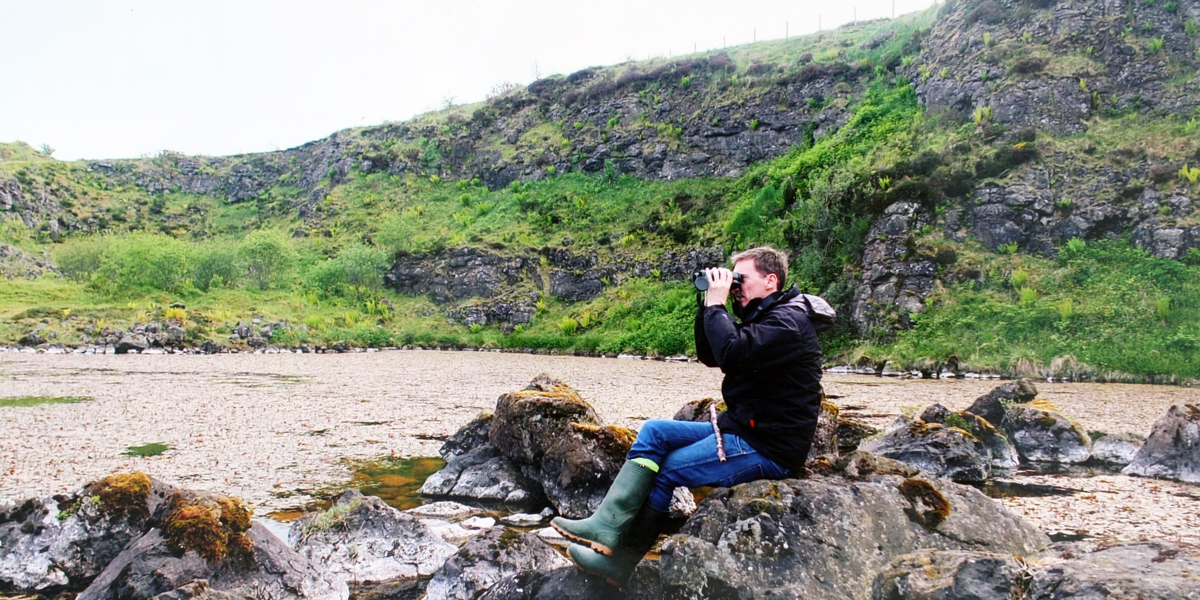Here’s Dúlra at one of his regular spots, binoculars glued to his face, trying to unravel a new mystery.
This place may not be as spectacular or picturesque as the Divis Mountain walk or the Lagan Towpath, but it’s one of his all-time favourites.
This weed-covered mountain quarry pool is overlooking Belfast, but few if any readers have ever seen it. Yet it’s not off-limits, no farmer owns it and it’s not private land. It’s just one of half-a-dozen abandoned quarries that dot Colin Mountain.
Dúlra spent countless summers fishing at this wee pool – decades before the weeds that now choke it arrived – and truth be told, he never caught a single fish. We were first attracted by the painted sign on one of the quarry rocks – ‘No Fishing’ – which inevitably had the opposite effect.
There certainly were fish in it – every dusk there were so many fish jumping that the lake looked like it was full of boiling water. But this secluded area is turned into an amphitheatre by the semi-circular cliffs. As soon as you come over the hill, the whole natural world is aware of your presence. Especially if you’re 15 and have as many mutts as mates with you.
Dúlra remembers one day he was fishing here, trying to keep as silent as a mouse in the hope he could convince the fish that the visitors had gone and it was safe to feed once more. And then he heard an almighty splash. His spaniel, which had been taken by his mates on a hunt for rabbits, had fallen from the top of the cliff on the right of this photograph and straight into the water. It seems she saw Dúlra down below and just ran off the cliff towards him!
That was yet another day’s fishing in vain.
But in truth, nothing was ever in vain at the ‘No Fishing’ lake. This is a mini-reserve that has been forgotten by the world outside. It’s never been bought by conservationists and turned into a park. It’s too dangerous and rugged for farm animals and nowadays teenagers from the city have a million better things to do.
And when you walk down into this tiny quarry, it always seems like there isn’t a single living creature within a hundred yards. But sit tight, be quiet – don’t bring a spaniel with you – and bit by bit nature will re-emerge. Dúlra remembers spending a whole summer fishing by the bank, then someone found a tiny meadow pipit’s nest – with four eggs – which was right at our feet the whole time.
Within five minutes this week, a bird appeared. Dúlra focused the binoculars. The song gave it away. A willow warbler. Before long, it was clear it was feeding chicks. Darting back and forward, Dúlra found a rock to sit on and watched patiently.
Willow warblers are our most common warblers. Hundreds of them arrive on to our hills arrive from Africa each year, building domed nests among the undergrowth in almost every hedgerow. Their nest is very difficult to find, but not impossible. Above all, it takes patience.
And so Dúlra settled down for the long wait at this lovely pool, trying to follow the adult bird as it darted into the vegetation at the side of the lake every few minutes. If he was only able to follow it as it disappeared and narrow it down to a square foot, he could then go and search among the grass. Twice he thought he had it, searched a small area, but to no avail. So he returned to the hard seat and watched again.
It was only after half an hour that he first noticed that this bird may not be all that it seems. Something just wasn’t right.
He could hear a willow warbler singing – but it wasn’t the bird that was clearly feeding chicks. It was another bird on a willow tree. The parent bird was always silent.
And it wasn’t as nervous as a willow warbler. It was feeding its chicks like clockwork, no matter that there was a person nearby. This was no ordinary warbler. This was a reed warbler, ceolaire giolcaí in Irish.
Fifty years ago, there wasn’t a single reed warbler in Ireland. Twenty years ago, there were 50. Today, perhaps a couple of hundred.
And one was nesting at Dúlra’s old fishing haunt.
They are not exactly exotic, though. Visit Oxford Island cafe on Lough Neagh and you’ll see them nesting right outside the front door.
And maybe this bird on Colin Mountain is one of the offspring from Oxford Island, spreading its wings, so to speak.
Its nest isn’t difficult to find at all – it’s wedged between the reeds – but Dúlra had been looking in the wrong place for the wrong type of bird.
This was a rarity that he didn’t want to disturb, so he just continued to watch from a distance. Another treasure thrown up by the forgotten, and magical, quarry pools of the Belfast Hills.






